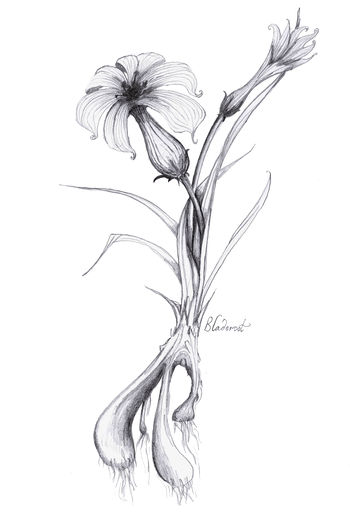Bladeroot
No edit summary |
mNo edit summary |
||
| Line 1: | Line 1: | ||
{{CaptionedImage|file=Bladeroot.jpg|align=right|width=350|caption=Artwork by Emmanuelle Midmer}} | {{CaptionedImage|file=Bladeroot.jpg|align=right|width=350|caption=Artwork by Emmanuelle Midmer}} | ||
==Description== | ==Description== | ||
This perennial flowering plant grows most commonly in cold environments, and is often called frost narcissus. The plant itself flowers briefly in late winter/early spring and is almost unique in that | This perennial flowering plant grows most commonly in cold environments, and is often called frost narcissus. The plant itself flowers briefly in late winter/early spring and is almost unique in that its flowers are grey in colouration - a ring of six circular petals around a darker inner trumpet. It is said to grow most freely over the graves of lovers, and in art and literature is closely associated with premature death. The woody bulb of the bladeroot is noticeably elongated compared to that of similar plants earning it the name Irremaisahne among the [[Suaq]] hunters due to its similarity to the [[Wintermark|Winterfolk]] [[Irremais|Rune of Wisdom]]. | ||
The root is mildly toxic, causing nausea, vomiting and dizziness if consumed raw. Properly prepared, these negative side effects pass quickly. | The root is mildly toxic, causing nausea, vomiting and dizziness if consumed raw. Properly prepared, these negative side effects pass quickly. | ||
Revision as of 18:11, 18 September 2015
Description
This perennial flowering plant grows most commonly in cold environments, and is often called frost narcissus. The plant itself flowers briefly in late winter/early spring and is almost unique in that its flowers are grey in colouration - a ring of six circular petals around a darker inner trumpet. It is said to grow most freely over the graves of lovers, and in art and literature is closely associated with premature death. The woody bulb of the bladeroot is noticeably elongated compared to that of similar plants earning it the name Irremaisahne among the Suaq hunters due to its similarity to the Winterfolk Rune of Wisdom.
The root is mildly toxic, causing nausea, vomiting and dizziness if consumed raw. Properly prepared, these negative side effects pass quickly.
Rules
- Can only be applied by a character with the physick skill.
- Using 10 seconds of appropriate roleplaying the physick can remove the weakness condition from a target.
